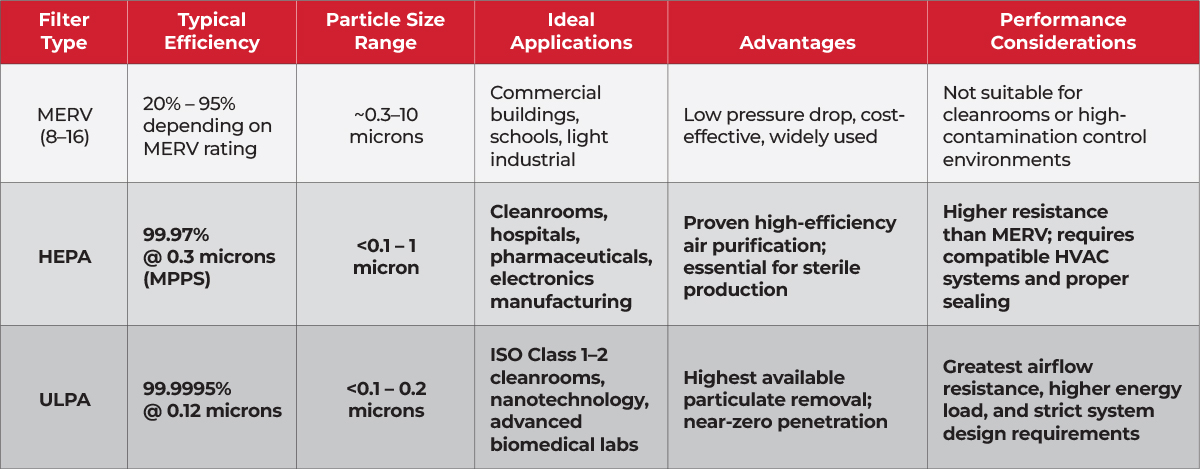

When it comes to protecting indoor air quality, HEPA and ULPA filters perform at much higher efficiencies than traditional MERV-rated HVAC filters by a wide margin. While MERV filters are effective for general air cleaning, providing greater protection with increased MERV ratings, environments that demand true contamination control — such as critical healthcare, pharmaceuticals, electronics, and semiconductor manufacturing — require far higher efficiency levels that only HEPA and ULPA technologies provide. This article explains how these filters work, what sets both HEPA and ULPA filters apart, and why these high-efficiency solutions remain essential for modern clean air systems.
Understanding HEPA Filtration: The Foundation of Modern Air Quality Control
In surroundings where air purity directly impacts health, product quality, and operational success, High Efficiency Particulate Air (HEPA) filtration stands as a proven standard of performance. Developed to meet the most demanding clean air requirements, HEPA technology continues to play a vital role in critical applications across healthcare, life sciences, electronics, and industrial sectors.
Defining HEPA Efficiency
HEPA filters are engineered to capture a minimum of 99.97% of airborne particles at 0.3 micrometers — the most penetrating particle size (MPPS). This exceptional performance is achieved through a dense network of microfibers that remove contaminants via diffusion, interception, and impaction. The result is reliable protection against airborne particulates such as dust, bacteria, mold spores, and even select viral aerosols.
Applications Across Critical Environments
HEPA filtration enables the controlled environments that make modern technology and medicine possible. Its uses include:
These applications demonstrate why HEPA remains central to achieving and maintaining cleanroom air quality standards.
From Industry Standard to Everyday Protection
Originally developed for high-containment environments, HEPA technology has expanded into everyday applications such as air purifiers, applications in the transportation industry—including aircraft, trains, and buses—and even residential HVAC upgrades for residents with compromised health issues. As concerns about indoor air quality grow, HEPA continues to provide a trusted solution for reducing airborne contaminants and enhancing occupant health and comfort.
High-Efficiency Air Filtration Comparison
This comparison chart shows a snapshot of how MERV, HEPA, and ULPA filters perform, highlighting the efficiency, particle capture, and cleanroom air quality advantages that set high-efficiency filtration apart.

Beyond HEPA Filtration: The Role of ULPA in Ultra-Clean Environments
As industries push the limits of precision manufacturing and biomedical innovation, air purity requirements have evolved beyond traditional HEPA capabilities. Ultra-Low Penetration Air (ULPA) filtration represents the next step — delivering extraordinary levels of cleanliness for environments where even the smallest particle can compromise quality, safety, or research integrity.
Defining ULPA Filtration Performance
ULPA filters capture 99.9995% of airborne particles down to 0.12 micrometers, far surpassing HEPA standards. By minimizing particle penetration to nearly undetectable levels, ULPA filtration supports operations requiring compliance with ISO Class 1 and Class 2 cleanroom classifications.
Where ULPA Filtration Matters Most
ULPA technology is used in many similar applications to HEPA filtration; however, the level of acceptable particulate contamination is even lower, including:
Balancing Filtration Performance and System Design
While ULPA filters provide unmatched particulate control, their higher airflow resistance requires thoughtful system engineering. Many facilities use a multi-stage filtration strategy — integrating prefilters, HEPA filters, and ULPA filters — to maintain efficiency, control energy usage, and extend filter service life.
Conclusion
Selecting the right air filtration solution begins with understanding the level of protection your environment requires. MERV filters provide reliable, cost-effective particle control for general commercial and institutional spaces. When higher efficiency is needed, HEPA filtration supports cleanrooms, healthcare facilities, and manufacturing processes where contamination control directly impacts safety and product integrity. For the most demanding applications, ULPA filters offer the highest degree of particulate removal, ensuring ultra-clean conditions for advanced technology, biosafety operations, and critical research environments.
Cleaner, safer indoor environments are the result of choosing filtration technology that meets the needs of your specific application. As a trusted expert in high-efficiency air filtration for critical environments, American Air Filter provides HEPA and ULPA solutions that enhance air quality and safeguard essential processes in healthcare, life sciences, manufacturing, and advanced technology sectors. Speak with an AAF representative today to identify the optimal filtration strategy for your cleanroom or facility.